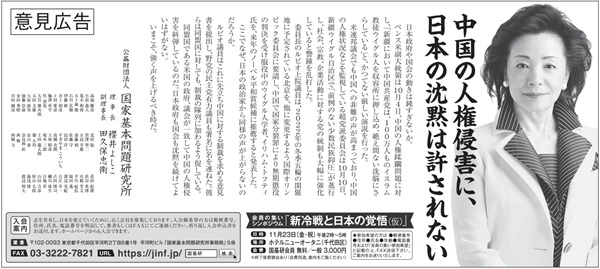There Can Never Be Any Room for Japan to Stay Silent in Face of China’s Human Rights Abuses
The Japan Institute for National Fundamentals placed an advocacy ad on the issue of China’s human rights abuses of Xinjiang Uyghur in two Japanese national dailies, Yomiuri Shimbun and Sankei Shimbun, on the October 23rd edition.
The following is a translation from the Japanese advocacy ad.
Aren’t the Japanese government, and the Diet, or the parliament, grossly slow in action in a moment of crisis of global significance?
U.S. Vice President Mike Pence delivered a speech, the most scathing and blistering ever to have been made by him, on the problem of horrendous human rights violations in China on Oct. 4, noting, “… in Xinjiang (of China’s far western border region), the Chinese Communist Party has imprisoned as many as one million Muslim Uyghurs in government camps where they endure around-the-clock brainwashing.”
Voices condemning China for its human rights records have also been surging in Congress of the United States. On Oct. 10, the Congressional-Executive Commission on China (CECC) – a bipartisan group of the U.S. congressional House and Senate lawmakers monitoring China’s human rights situation – released an announcement that raised a serious alarm over the matter. The CECC announcement said “unprecedented repression of ethnic minorities” has kept deteriorating in the Xinjiang Uyghur Autonomous Region, causing “dramatic increases” in Communist Party control of society, religions and business activities.
CECC Chair Marco Rubio, a Republican senator, has urged the International Olympic Committee for “pulling the 2022 Winter Olympics from Beijing” and instead picking a city other than the Chinese capital as the host of the Winter Games. The commission chair has also announced that CECC intends to nominate imprisoned prominent Uyghur academic Ilham Tohti for the 2019 Nobel Peace Prize. Tohti has been in jail after being sentenced in September 2014 to imprisonment for life on charges of separatism.
In this situation, why on earth have voices similar with those in the United States failed to emerge from among Japanese politicians?
CECC Chair Rubio submitted a letter to the administration of President Donald Trump earlier this year, prodding the government to impose sanctions on Chinese officials responsible for human rights abuses of Xinjiang Uyghurs. The letter of the legislators’ group led by Rubio across party lines was signed by Republicans as well as influential members of the opposition Democratic Party. In addition, they have been calling for U.S. allies to join the ranks of like-minded nations for effecting anti-Beijing sanctions.
Currently, the government and Congress of the United States, Japan’s ally, have been acting in concert for accusing China of serious human rights abuses. There can be no reason at all for the Japanese government and the Diet to simply remain silent on the gravity of the situation.
We are strongly hopeful that Japan will raise its voice robustly right now to condemn the severe violations of human rights.


